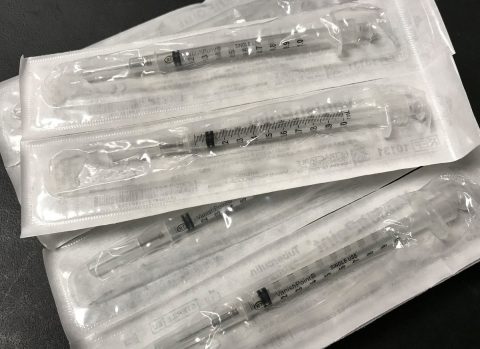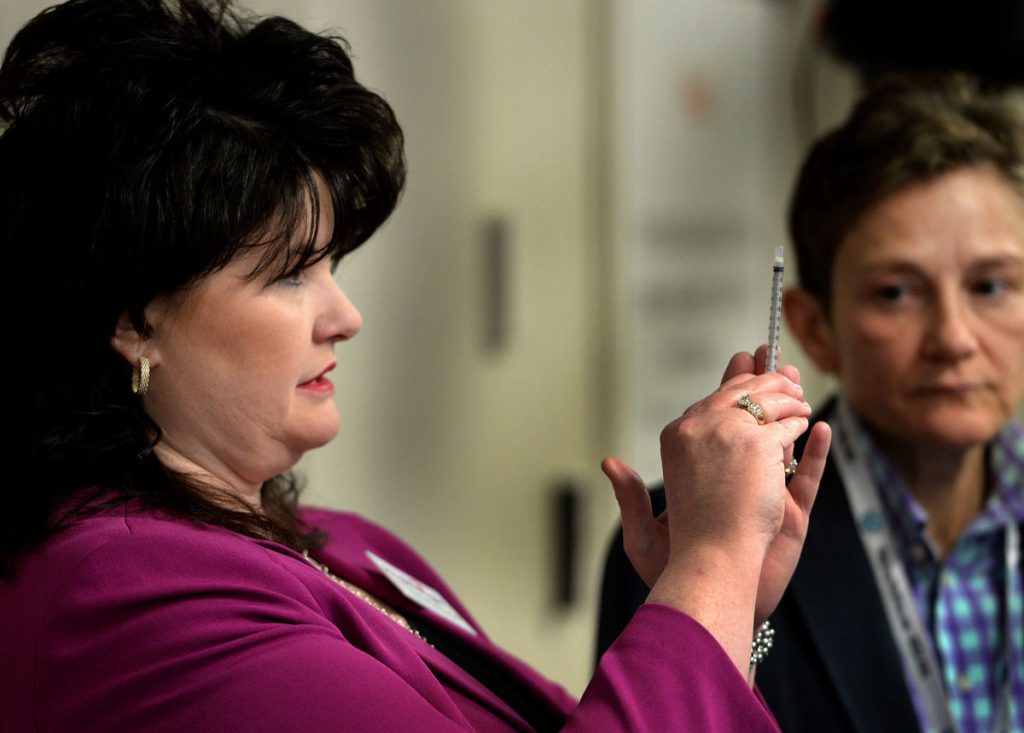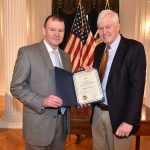Angie Settle (left), CEO of West Virginia Health Right, demonstrates how a retractable needle works. Health Right has started giving out these needles. Kenny Kemp, Gazette-Mail.
By: Lori Kersey, Staff Writer | Posted: Mar. 21, 2018 | Source: WV Gazette-Mail
While Charleston officials are at odds over the future of harm reduction services in the capital city, a little-known needle exchange program in the city is making changes.
West Virginia Health Right, a free and charitable clinic, announced Wednesday that it is starting to distribute retractable needles at its harm reduction clinic.
“This is a needle that, as soon as it’s injected, the needle goes into the hub and it’s in plastic and it’s not to be tampered with, in terms of anybody getting stuck with it,” Health Right CEO Angie Settle said.
Health Right quietly started offering harm reduction services, including a syringe exchange, in 2011, Settle said. She held a news conference Wednesday morning to clarify what she said are misconceptions about the program.
Settle said she supports the concept of harm reduction but that she also supports Charleston Mayor Danny Jones in his concern about dirty needles.
She said she also supports the city’s first responders, who have spoken out about the program. She said her program is run using a different model than the one at the health department.

New retractable needles West Virginia Health Right is giving out as a part of its harm reduction program by Kenny Kemp Gazette-Mail
“I’m concerned about the needles that we’re finding, but I would offer that the concept of harm reduction is not universal to just doing the program one way,” Settle said. “It can be done different ways. There can be tighter controls.”
The Charleston City Council on Monday delayed for 60 days voting on a bill that would criminalize possessing needles used as drug paraphernalia. Police and first responders say the harm reduction clinic at KCHD has led to dirty needles being found in public places, on the people they regularly arrest or treat for overdoses and in abandoned buildings in Charleston. Health department officials say their program has distributed 651,000 needles since the program started in 2015 and 424,000 of them have been returned.
Settle said there was no legislation protecting her patients in 2011. In 2015, Charleston passed an ordinance decriminalizing needle possession, to make way for the health department’s program.
Now, Settle said, she fears that, if Charleston were to again criminalize needle possession, it would mean the end of her clinic’s program, too. It could also hurt grant funding for programs involving harm reduction that Health Right does, she said.
Christine Teague, director of CAMC’s Ryan White Program, works with Health Right to provide mobile harm reduction services in Roane, Clay, Logan and McDowell counties. She said Health Right will review data and poll patients about the retractable needles.
At 50 cents each, the retractable needles will cost Health Right three times what regular syringes cost, Settle said.
“We’re going to give it a try. I feel like we’re at the level here locally that something has to be done,” she said. “I want to also be able to distinguish what needles came from West Virginia Health Right and which ones did not.”
Settle said her clinic is a one-to-one syringe exchange.
“On the first visit, you’re given 30 needles,” Settle said. “It’s explained in full detail that, when we see you the next time, we expect to see 30 needles in your little safety red box that we open and count.”
Those who don’t return all the needles are expelled from the program, Settle said.
“Some may see that as harsh,” she said, “but I see that as a safeguard.”
About 300 patients come to the clinic each month for some sort of harm reduction service, and about 150 patients get needles as a part of that program, she said.
Settle said about 10 percent of patients who come for harm reduction services get needles for the first time and then don’t come back to return them. She said a health care provider talks to each patient about the dangers of IV drug use and a therapist will again ask them about getting into rehab. She said about a third of the patients there have gotten into treatment for their addiction.
“The overwhelming, overarching hope is that these people will go into rehab,” Settle said.
Reach Lori Kersey at lori.kersey@wvgazettemail.com, 304-348-1240 or follow @LoriKerseyWV on Twitter.








